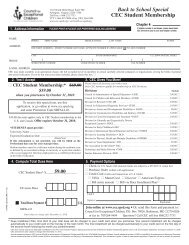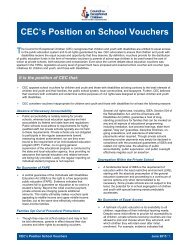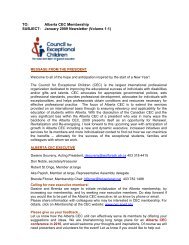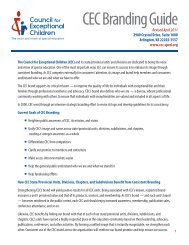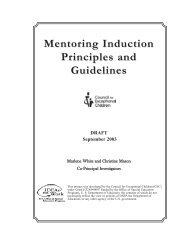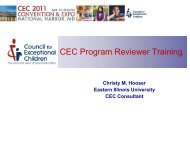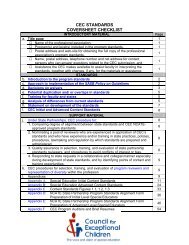- Page 1 and 2:
What Every Special Educator Must Kn
- Page 3 and 4:
Council for Exceptional Children Co
- Page 5 and 6:
Table of Contents Introduction ....
- Page 7 and 8:
Initial Content Standard 5: Learnin
- Page 9 and 10:
Special Education Standard 6: Commu
- Page 11 and 12:
It was through significant professi
- Page 13 and 14:
and advocate for the resources to i
- Page 15 and 16:
professional sTandards & praCTiCe C
- Page 17 and 18:
2008 CeC naTional reCogniTion progr
- Page 19 and 20:
Section 1: CEC Code of Ethics and S
- Page 21 and 22:
Parent Relationships Professionals
- Page 23 and 24:
Other Professionals Special educati
- Page 25 and 26:
Section 2: Assuring Well-Prepared S
- Page 27 and 28:
Figure 2.2 Minimum CEC Expectations
- Page 29 and 30:
Teaching and America’s Future (NC
- Page 31 and 32:
Several issues are confronting stat
- Page 33 and 34:
sTandards for ConTinuing learning a
- Page 35 and 36:
Washington, DC: Author. Retrieved O
- Page 37 and 38:
Section 3: Preparing to Become a Sp
- Page 39 and 40:
submitted assuring that the graduat
- Page 41 and 42:
ship is a professional relationship
- Page 43 and 44:
Section 4: Tools and Strategies for
- Page 45 and 46:
CEC Content Standards 2. Developmen
- Page 47 and 48:
CEC Content Standards 7. Instructio
- Page 49 and 50:
Figure 4.3 Comparing CEC Initial Co
- Page 51 and 52:
ICC5K5 Social skills needed for edu
- Page 53 and 54:
ICC7S6 Sequence, implement, and eva
- Page 55 and 56:
Special Education Standard 10: Coll
- Page 57 and 58:
Figure 4.4 Professional Development
- Page 59 and 60:
IGC10S1 Use local community, and st
- Page 61 and 62:
Skills ICC10S1 ICC10S2 ICC10S3 ICC1
- Page 63 and 64:
on student learning, NCATE expects
- Page 65 and 66:
Section 5: Initial and Advanced Pro
- Page 67 and 68:
educators are familiar with augment
- Page 69 and 70:
InItIal Content StandardS for eduCa
- Page 71 and 72:
Initial Special Education Teachers
- Page 73 and 74:
ICC3K3 Variations in beliefs, tradi
- Page 75 and 76:
ICC5K10 Strategies used by diverse
- Page 77 and 78:
ICC7K4 Technology for planning and
- Page 79 and 80:
ICC8S7 Report assessment results to
- Page 81 and 82:
ICC10S4 Assist individuals with exc
- Page 83 and 84:
Initial Special Education Teachers
- Page 85 and 86:
ICC3K5 Differing ways of learning o
- Page 87 and 88:
ICC5S6 Use performance data and inf
- Page 89 and 90:
Skills ICC7S1 ICC7S2 Identify and p
- Page 91 and 92:
IIC8S5 Develop and use a technology
- Page 93 and 94:
ICC10S9 ICC10S10 Communicate with s
- Page 95 and 96:
Initial Special Education Teachers
- Page 97 and 98:
Skills ICC4S1 Use strategies to fac
- Page 99 and 100:
ICC6K2 ICC6K3 Characteristics of on
- Page 101 and 102:
ICC8K4 Use and limitations of asses
- Page 103 and 104:
Skills ICC10S1 Maintain confidentia
- Page 105 and 106:
Initial Special Education Professio
- Page 107 and 108:
ICC3K2 ICC3K3 ICC3K4 ICC3K5 Impact
- Page 109 and 110:
ICC5S7 Establish and maintain rappo
- Page 111 and 112:
ICC7S6 Sequence, implement, and eva
- Page 113 and 114:
Standard 9: Professional And Ethica
- Page 115 and 116:
ICC10S10 Communicate effectively wi
- Page 117 and 118:
Initial Special Education Teachers
- Page 119 and 120:
Skills ICC4S1 Use strategies to fac
- Page 121 and 122:
Skills ICC6S1 ICC6S2 Use strategies
- Page 123 and 124:
Standard 9: Professional And Ethica
- Page 125 and 126:
Initial Special Education Teachers
- Page 127 and 128:
GT5K2 Skills GT5S1 GT5S2 GT5S3 GT5S
- Page 129 and 130:
GT9S2 Maintain confidential communi
- Page 131 and 132:
Initial Special Education Teachers
- Page 133 and 134:
Standard 4: Instructional Strategie
- Page 135 and 136:
DD5S5 Plan instruction for individu
- Page 137 and 138:
DD8K2 Environmental assessment cond
- Page 139 and 140:
ICC10S5 ICC10S6 Plan and conduct co
- Page 141 and 142:
Initial Special Education Teachers
- Page 143 and 144: Standard 4: Instructional Strategie
- Page 145 and 146: ICC5S10 Use effective and varied be
- Page 147 and 148: Standard 8: Assessment Knowledge No
- Page 149 and 150: ICC10K3 ICC10K4 LD10K1 LD10K2 Skill
- Page 151 and 152: Initial Special Education Teachers
- Page 153 and 154: Skills PH3S1 Address learned helple
- Page 155 and 156: ICC5S11 Use the least intensive beh
- Page 157 and 158: PH7S2 Integrate individualized heal
- Page 159 and 160: ICC10K2 ICC10K3 ICC10K4 PH10K1 Skil
- Page 161 and 162: Initial Special Education Teachers
- Page 163 and 164: Standard 4: Instructional Strategie
- Page 165 and 166: ICC5S11 Use the least intensive beh
- Page 167 and 168: Standard 8: Assessment Knowledge IC
- Page 169 and 170: Standard 10: Collaboration Knowledg
- Page 171 and 172: pluralistic society to promote evid
- Page 173 and 174: Special Education Diagnostic Specia
- Page 175 and 176: ACC3S3 Use educational research to
- Page 177 and 178: ED5S3 Cite all sources of reported
- Page 179 and 180: Special Education Technology Specia
- Page 181 and 182: Standard 3: Research and Inquiry Kn
- Page 183 and 184: ACC5S6 Develop and implement a pers
- Page 185 and 186: Special Education Transition Specia
- Page 187 and 188: Standard 4: Individual and Program
- Page 189 and 190: TS6S4 Provide transition-focused te
- Page 191 and 192: Special Education Administrators St
- Page 193: Skills ACC3S1 Identify and use the
- Page 197 and 198: Special Education Early Childhood S
- Page 199 and 200: AEC2S6 Use recommended practices to
- Page 201 and 202: AEC6K1 NOTES: Roles and responsibil
- Page 203 and 204: Special Education Deaf and Hard-of-
- Page 205 and 206: Standard 4: Individual and Program
- Page 207 and 208: Section 6: Paraeducators Serving In
- Page 209 and 210: KnoWledGe and SKIllS for paraeduCat
- Page 211 and 212: Skills SEP8S1 Demonstrate basic col
- Page 213 and 214: SpeCIalIzatIon KnoWledGe and SKIll
- Page 215 and 216: DBI4S3 Facilitate direct learning e
- Page 217 and 218: DBI6S6 Incorporate/embed language a
- Page 219 and 220: DBI10S2 Share observations of indiv
- Page 221 and 222: Standard PE4K2 Skills PE4S1 PE4S2 P
- Page 223 and 224: Standard PE9K2 Skills PE9S1 PE9S2 P
- Page 225 and 226: FORM 2 Special Education Paraeducat
- Page 227 and 228: Standard Standard 6: Language Knowl
- Page 229 and 230: Standard Skills PE10S1 Assist in co
- Page 231 and 232: Appendixes Supervision of Paraeduca
- Page 233 and 234: ICC6K2 Characteristics of one’s o
- Page 235 and 236: Appendix 2: ArChiteCture of the CeC
- Page 237 and 238: Figure 2.1: CEC Initial Special Edu
- Page 239 and 240: Tenative Schedule Appendix 4: VAlid
- Page 241 and 242: The Knowledge and Skill Standards a
- Page 243 and 244: publication. In 1996, the KSS began
- Page 245 and 246:
esources. 1993 CEC revises the Stan
- Page 247 and 248:
The National Board for Professional
- Page 249 and 250:
CEC Professional Entry Level Standa
- Page 251 and 252:
ICC4S4 ICC4S5 ICC4S6 Use strategies
- Page 253 and 254:
Special Education Standard 7: Instr
- Page 255 and 256:
Skills ICC9S1 ICC9S2 Practice withi
- Page 257 and 258:
Appendix 7: CeC nAtionAl progrAm re
- Page 259 and 260:
Appendix 8: SpeCiAl eduCAtion mento
- Page 261 and 262:
Guides development and adoption of
- Page 263 and 264:
Section Three - Part 1 Basic Commit
- Page 265 and 266:
Paragraph 2 - Government Responsibi
- Page 267 and 268:
disability, this setting must be se
- Page 269 and 270:
d. Joint planning, coordination, an
- Page 271 and 272:
activities, and interventions relat
- Page 273 and 274:
It is sometimes necessary, however,
- Page 275 and 276:
end product must always be the exce
- Page 277 and 278:
Paragraph 15 - Assessment and Accou
- Page 279 and 280:
all four extremities, including the
- Page 281 and 282:
a. Nondiscriminatory, ongoing asses
- Page 283 and 284:
4. Interpreters (from natural sign
- Page 285 and 286:
whereby special education has a pri
- Page 287 and 288:
Some of the events and changes that
- Page 289 and 290:
Paragraph 2 - Ethnicity and Excepti
- Page 291 and 292:
outcomes. Further, we believe that
- Page 293 and 294:
esearch, and community service and
- Page 295 and 296:
are responsible for upholding and a
- Page 297 and 298:
3.2 Professional Employment a. Cert
- Page 299 and 300:
(1) Conceptual Framework. Programs
- Page 301 and 302:
Appendix 10: deVeloping A performAn
- Page 303 and 304:
description of the unit’s philoso



